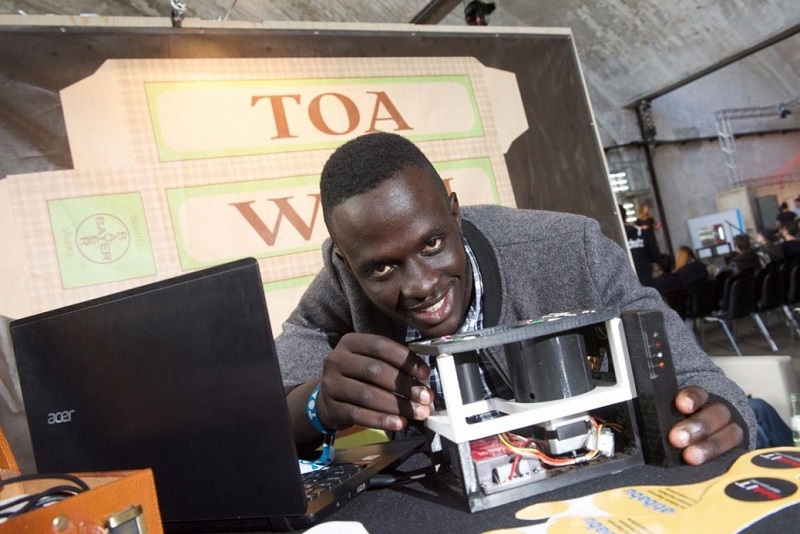Brian Gitta on Wednesday evening had his name penned in African history books after winning the Africa Prize for Engineering Innovation, becoming, according at an official statement, the first Ugandan to win the prestigious Prize, and the youngest winner to date.
A graduate of software engineering from Makerere University, Gitta alongside his team developed Matibabu, a device which tests for malaria without drawing blood.
Swahili for ‘medical centre’, Matibabu is a low-cost, reusable device that clips onto a patient’s finger, requiring no specialist expertise to operate. It produces results within one minute on a mobile phone that is linked to the device.
The innovation depends on red-laser beam technology that can study the pattern of red blood cells and identify abnormalities which could imply malaria in one’s blood.
With limited resources for setting up sophisticated infrastructure, especially in developing countries, the Matibuba kit tackles the challenge for the need of resourced medical laboratories to test for malaria. Matibabu is currently undergoing testing in partnership with Mulago Hospital and is sourcing suppliers for the sensitive magnetic and laser components required to scale up production.
The 24-year-old was announced the winner of the UK £25,000 (Shs124 million) prize, after beating other three innovators in a grand ceremony held in Nairobi, Kenya. The other three finalists were Collins Saguru, a chemical engineer from Zimbabwe who came up with AltMet, an affordable and more environmental friendly metal recycling method; Michael Asante from Ghana uses Science Set to provides materials to enhance practical science studies and experiments; and the iMeter developed by Ifediora Ugochukwu from Nigeria allows one to monitor their electricity consumption remotely.
Founded by the Royal Academy of Engineering in the UK, the Africa Prize for Engineering Innovation is Africa’s biggest prize dedicated to engineering innovation. It encourages talented sub-Saharan African engineers, from all disciplines, to develop innovations that address crucial problems in their communities in a new, appropriate way.
A statement by the Prize organisers, says that through their participation in the Africa Prize, the Matibabu team have been approached by international researchers offering support and are currently writing up their ground-breaking findings into an academic paper, to be published within the next few months.
Speaking at the grand event, Rebecca Enonchong, one of the judges, said: “We are very proud of this year’s winner. It’s a perfect example of how engineering can unlock development – in this case by improving healthcare.”
She added, according to the statement, “Matibabu is simply a gamechanger.”
Apart from Brian Giita, 3 other Ugandans made it to the 16 innovations shortlist. They included Alvin Kabwama, who presented UriSAF Maternal and Sexual Reproductive Health Care Kit, which detects any infections in one’s body through urine tests; Arthur Woniala invented cheap Khainza Energy Gas which is made from manure; and Lawrence Okettayot’s Sparky Dryer prolongs fruits and vegetable’s shelf life by use of a low-tech dehydrator hence reducing food wastage.
The call for Engineering Innovations for the fifth edition is already underway. The Africa Prize provides a unique package of support, including funding, comprehensive business training, bespoke mentoring and access to the Royal Academy of Engineering’s network of high profile, experienced engineers and experts, and their networks.
It helps turn engineers with incredible ideas into successful entrepreneurs. Launched in 2014, the Prize aims to stimulate, celebrate and reward engineers who have developed innovations that will benefit Africans.
In a Thursday official statement, Gitta was quoted, saying: “We are incredibly honoured to win the Africa Prize – it’s such a big achievement for us, because it means that we can better manage production in order to scale clinical trials and prove ourselves to regulators. The recognition will help us open up partnership opportunities – which is what we need most at the moment.”
Gitta and his team were congratulated by social media as shown in some of the statements below.
Congratulations @matibabu8 for winning the 2018 #AfricaPrize for your malaria diagnostic kit! Very well deserved award! Congrats to @gittabrian and team! pic.twitter.com/ccGUZFxyAb
— Solomon King (@solomonking) June 13, 2018
Well done @matibabu8 team for winning #AfricaPrize 2018. pic.twitter.com/LE07lyUhb0
— MamaOpe (@mama_ope) June 13, 2018
Congratulations ??to @matibabu8 from Uganda on winning the 2018 #AfricaPrize for Engineering Innovation & £25,000! Because of @gittabrian & team, we now have a new way to test for #malaria quickly, accurately, & without drawing blood#TourUganda #PearlofAfrica #MedicalTourism pic.twitter.com/H1JlNYnovd
— Tourism Uganda (@Tourismuganda) June 13, 2018

